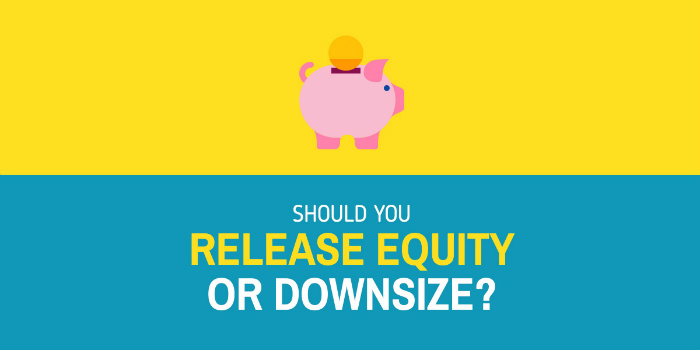It is a common occurrence that as we get older, much of our money is tied up in property.
This can leave many people cash poor but asset rich. So, what are your options if you want to use some of the cash that is currently tied up in a property that you own. Your major options are equity release and downsizing.
What is equity release? What is downsizing?
Essentially equity release and downsizing are the two main options available to individuals who want to release money that is tied up in the property that they own.
Downsizing is perhaps the more obvious of the two – it is simply selling your property in order to release funds and reduce financial costs, and moving to a smaller home.
As the smaller home is cheaper to buy and less expensive to manage, this can provide you with extra cash to use or invest.
Equity release is an increasingly popular option – in fact, there are more than five times more equity release deals now than there were in 2014.
Releasing equity allows you to stay in your current home, taking out a loan against the value of the property.
There are many different options available including withdrawing the amount you need as a lump sum or planning a ‘drawdown’ in which smaller amounts are released to you over a period of time. Equity release can be a more complicated option, and you will generally require independent financial advice before you choose this option.
However, there are pros and cons to both equity release and downsizing. Here we take a look at them to help make your decision a little easier.
The pros of equity release
The major benefit of equity release over downsizing is that you get to stay in your current property, while still utilising some of its value by releasing cash to use as you see fit.
“There is none of the stress associated with moving house or the costs involved with selling,” says independent equity release advisor John Whyte “you are covered until you decide to sell your home, move into full-time care or pass away”.
It should also be noted that what you do with your equity release money is completely down to you. Whether you are making improvements to the property or simply funding your lifestyle, there are no limitations.
You could withdraw small amounts in order to add to your retirement
An equity release is a type of loan but you won’t actually have to pay anything back until your property is sold or you pass away. At this time the repayment will be deducted from the sale of the home. It is also notable that you will only pay interest on money that you actually withdraw, which can help you keep costs down.
The cons of equity release

The drawbacks of equity release, tend to affect your loved ones, rather than yourself. Borrowing money via equity release will affect the size of inheritance that you leave to your family.
The interest on the loan rolls up, so if you take your equity release over a long period of time, the total cost can end up owing the whole value of the property and therefore leaving nothing for loved ones to inherit.
It is important to consider this fact before you choose any equity release plan – especially if you don’t like the idea of leaving nothing to your family and friends.
However, it should be noted that if you work with a skilled financial advisor, they can provide you with a number of options that could help you to manage your finances and provide an inheritance.
The pros of downsizing
Downsizing is typically seen as a simpler option for raising money compared to equity release. For example, there are no age restrictions in downsizing, and none of the complexities of choosing an equity plan that may or may not suit your needs and desires as you get older.
Depending on your current property and the one that you move to, you can raise a significant amount of money through downsizing.
This can come not only through the sale of the
A smaller home is additionally easier to clean and maintain, which could actually leave you with more free time.
Additionally, you may have already been considering making a move in order to suit your lifestyle – perhaps by moving to a more peaceful area or closer to friends and family.
The cons of downsizing
Managing downsizing effectively is crucial in order to make the most out of the sale of your home. It is absolutely vital that you conduct full research into the situation.
You do not want to be left in a scenario in which your home is actually worth a lot less than you imagine, and ultimately ends up not providing you with the amount of money than you need.
Remember that there are lots of factors to consider when selling a property. For example, costs such as moving, estate agent fees, stamp duty, conveyancing, and more, can build up and end up significantly reducing your net financial gain.




